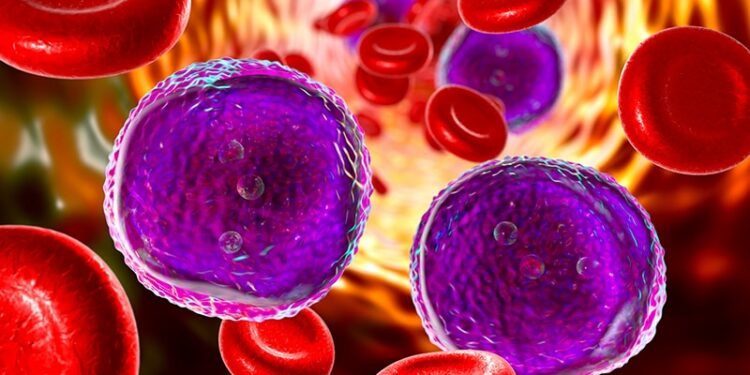[ad_1]
The National Institute for Health and Care Excellence (NICE) has recommended blinatumomab (Blincyto, Amgen) with chemotherapy for NHS use in adults with aggressive leukaemia.
The combination therapy is now an option for patients with Philadelphia-chromosome-negative, CD19-positive B-cell precursor acute lymphoblastic leukaemia (ALL), even if they have no detectable minimal residual disease (MRD) at the start of consolidation treatment.
NICE described blinatumomab as “a breakthrough in the way the immune system fights cancer cells”. The treatment enhances the body’s own immune system response to recognise and destroy cancer cells that remain after initial therapy.
Relapse Common and Devastating
While most patients with ALL achieve an initial haematologic complete response, up to half relapse, usually within 2 years of initial treatment.
Minimal residual disease, detectable only with molecular techniques, is a key predictor of recurrence. Blinatumomab is already approved for MRD-positive ALL. However, relapses also occur in MRD-negative disease.
Fewer Relapses and Better Survival
A key clinical trial found that adding blinatumomab to consolidation chemotherapy in MRD-negative adult patients significantly improved overall survival and reduced the risk of recurrence by more than half, NICE said.
Interim analysis of results of the ongoing phase 3 E1910 trial, published in the New England Journal of Medicine in July 2024, showed that blinatumomab improved overall survival and reduced recurrence risk by more than half.
The study, conducted across 77 centres in the US, Canada, and Israel, included 224 adults aged 30 to 70 with newly diagnosed Ph-chromosome-negative, B-cell precursor ALL, randomised to blinatumomab or chemotherapy alone.
After a median follow-up of 43 months, overall survival at 3 years was 85% in the blinatumomab group compared with 68% in the chemotherapy-only group (hazard ratio for death, 0.41). Relapse-free survival was also higher (80% vs. 64% at 3 years, hazard ratio for relapse or death, 0.53).
Cost and NHS Access
In final draft guidance, NICE concluded that there is now “enough evidence to show that blinatumomab with chemotherapy provides benefits and value for money” in MRD-negative disease. There was also evidence to suggest that earlier use of blinatumomab for MRD-negative disease may prevent the disease worsening and becoming MRD-positive.
Approval for routine use across the NHS in England NHS approval is contingent on a confidential commercial agreement, offering a discount on the list price of £2017 per 38.5-microgram vial. The drug was approved in the United States in June 2024.
Helen Knight, director of medicines evaluation at NICE, said in a press release that blinatumomab could give patients “precious extra months and potentially years” with loved ones. “The evidence showing how well it works is really compelling,” she said.
Around 80 patients per year are expected to benefit from the decision.
Dr Sheena Meredith is an established medical writer, editor, and consultant in healthcare communications, with extensive experience writing for medical professionals and the general public. She is qualified in medicine and in law and medical ethics.
[ad_2]
Source link : https://www.medscape.com/viewarticle/nice-backs-new-drug-combo-acute-lymphoblastic-leukaemia-2025a10004r6?src=rss
Author :
Publish date : 2025-02-24 18:37:57
Copyright for syndicated content belongs to the linked Source.














